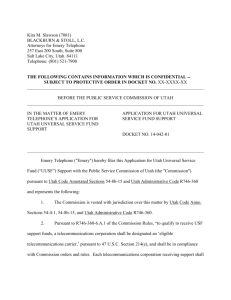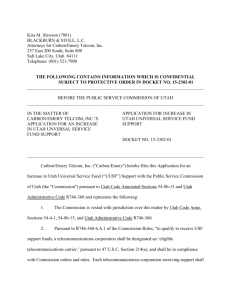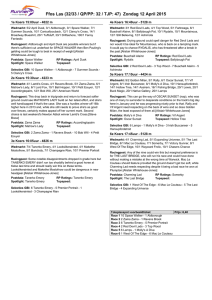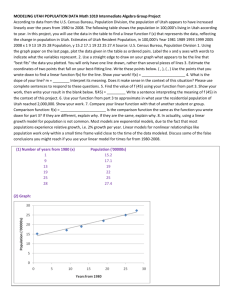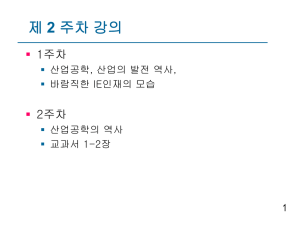Stanley K - Utah Public Service Commission
advertisement
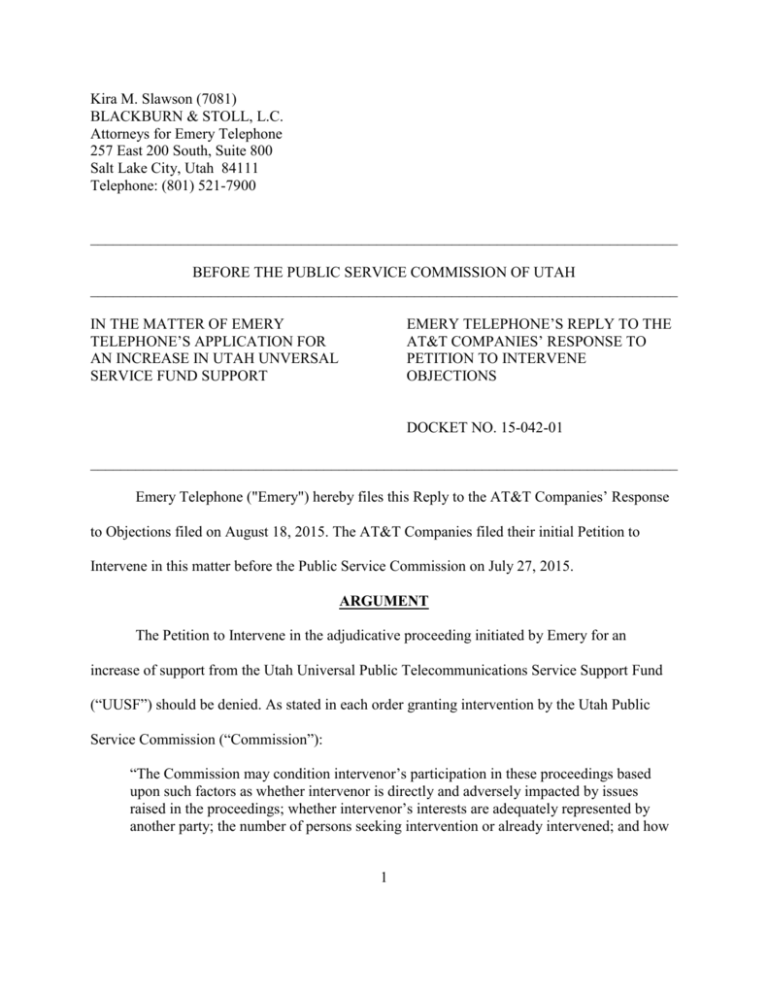
Kira M. Slawson (7081) BLACKBURN & STOLL, L.C. Attorneys for Emery Telephone 257 East 200 South, Suite 800 Salt Lake City, Utah 84111 Telephone: (801) 521-7900 ______________________________________________________________________________ BEFORE THE PUBLIC SERVICE COMMISSION OF UTAH ______________________________________________________________________________ EMERY TELEPHONE’S REPLY TO THE AT&T COMPANIES’ RESPONSE TO PETITION TO INTERVENE OBJECTIONS IN THE MATTER OF EMERY TELEPHONE’S APPLICATION FOR AN INCREASE IN UTAH UNVERSAL SERVICE FUND SUPPORT DOCKET NO. 15-042-01 ______________________________________________________________________________ Emery Telephone ("Emery") hereby files this Reply to the AT&T Companies’ Response to Objections filed on August 18, 2015. The AT&T Companies filed their initial Petition to Intervene in this matter before the Public Service Commission on July 27, 2015. ARGUMENT The Petition to Intervene in the adjudicative proceeding initiated by Emery for an increase of support from the Utah Universal Public Telecommunications Service Support Fund (“UUSF”) should be denied. As stated in each order granting intervention by the Utah Public Service Commission (“Commission”): “The Commission may condition intervenor’s participation in these proceedings based upon such factors as whether intervenor is directly and adversely impacted by issues raised in the proceedings; whether intervenor’s interests are adequately represented by another party; the number of persons seeking intervention or already intervened; and how 1 intervenor’s participation will affect the just, orderly and prompt conduct of the proceedings.”1 The AT&T Companies have not demonstrated that their legal interests will be substantially affected by the outcome of the matter or that their interests are not adequately represented by another party, and therefore, they should be prevented from participating in this proceeding. The Division of Public Utilities (the “Division”) is the administrator of the UUSF (See R746-360-3.A), and the Division alone has been granted the power to administer the UUSF. In order to complete this task, the Division, as the administrator “shall have access to the books of accounts of all telecommunications corporations and retail providers, which shall be used to verify the intrastate retail revenues assessed in an end-user surcharge, to confirm the level of eligibility for USF support and to ensure compliance with [Commission rules]. (See Utah Admin. Code R746-360-3.A). Additionally, the Office of Consumer Services has the statutory authority to evaluate the potential “impact of a utility rate changes and other regulatory actions related to an applicable public utility on residential customers and small commercial consumers.” (See Utah Code Ann.§ 54-10a-302(1)(a). The AT&T Companies’ legal rights align with the appointed tasks of the Division and the Office, and any attempt to insert themselves into the proceeding would prove to be an unnecessary intrusion into Emery’s Application review. Such an effort by the AT&T Companies would only serve to delay the evaluation and expose Emery’s sensitive financial information to a direct competitor. 1 Order Granting Intervention, Docket Nos. 11-2180-01; 14-035-T02; 15-035-53. 2 I. proceeding. The AT&T Companies legal interests will not be substantially affected by the To intervene in an adjudicative proceeding, the petitioning party must show “the petitioner’s legal interests may be substantially affected by the formal adjudicative proceeding; and the interests of justice and the orderly and prompt conduct of the adjudicative proceedings will not be materially impaired by allowing the intervention.” Utah Code Ann. §63G-4-207. To support the requirement that the AT&T Companies’ legal interests will be substantially affected by the outcome of Emery’s Application for increased UUSF support, the AT&T Companies initially argued that: 1. 2. 3. The AT&T Companies are required to make regular payment to the UUSF; If the Commission grants Emery’s request for increased UUSF support, this will substantially increase the amount of money that the AT&T Companies will have to pay into the UUSF; and Customers of the AT&T Companies may be impacted if the AT&T Companies are forced to increase rates to cover the increased UUSF contributions that may be required as a result of the relief requested by Emery Telephone. See Petition to Intervene, pp.2-3, ¶¶3-5) Recognizing that their initial grounds for intervention were lacking, the AT&T Companies now argue that they have standing because they are a direct competitor of Emery; “are among a rather limited group of telecommunications companies required by law to contribute to the state USF fund;” and will be required to “assess, collect, and remit [the] surcharge” applied to the end-user, and that an increase in this charge has a direct and negative impact on the AT&T Companies because it results in an increase in the cost of service. AT&T’s Response, p. 3. The AT&T Companies claim that they are “among a rather limited group of telecommunications companies required by law to contribute to the state USF fund” gives the 3 impression that the AT&T Companies are singled out from a larger group of telecommunications companies that are not required by law to contribute to the state USF fund. In fact, under Utah law, all telecommunications corporations providing telecommunications services subject to USF surcharges are required to collect surcharge revenues from the end-users, and submit those funds to the Commission. See Utah Admin. Code. R746-360-5.A.1. The AT&T Companies are not in any different position than every other telecommunications corporation in the state in assessing, collecting, and remitting the USF surcharge. Nor are the AT&T Companies in any distinct position from the residential consumers and business customers who will be required to pay the UUSF surcharge as a line item on their telecommunications providers’ bills. The AT&T Companies have not shown that their legal interests may be substantially affected by this proceeding. Rather, their arguments show, at most, a tangential interest in the outcome of this matter. As discussed below, absent a substantial legal interest in this matter that is not protected by another party, the harms associated with permitting the AT&T Companies’ intervention in this matter outweigh any possible benefits. II. Participation by the AT&T Companies in this matter is not necessary because their interests are directly aligned and protected by the Office of Consumer Services and the Division of Public Utilities. On March 27, 2015, the Commission tasked the Division with assessing and evaluating Emery’s Application. In addition to an examination by the Division, Section 54-10a-301 of the Utah Code obligates the Office to “assess the impact of utility rate changes and other regulatory actions related to an applicable public utility on: residential consumers; and small commercial consumers.” These two government entities have been tasked with (one by superior government entity, the other by statute) with ensuring that Emery’s Application meets the applicable 4 regulatory standards and rules. Both the Division and the Office have participated in numerous similar UUSF applications, and they are wholly competent to review and analyze pertinent financial data without the need of assistance from an intervening third party. The AT&T Companies’ argue that as “payees” into the UUSF fund and competitors of Emery, they “have a right to ensure that the standards set forth in the [UUSF] statute are observed, that the fund is operated in a ‘nondiscriminatory and competitively and technologically neutral fashion in . . . distribution of funds, neither providing a competitive advantage for, nor imposing a competitive disadvantage upon’ other telecommunications providers such as the AT&T Companies.” AT&T’s Response, p. 4 (quoting UCA §54-8b-15). While it is true that the operation of the fund may not create any disadvantage among competing providers, the statute does not grant the AT&T Companies as payees into the fund, or competitors of Emery, “the right to ensure” that the standards set forth in the statute are observed. Nor does the statute or the rules grant the AT&T Companies the right to review the books and records of competing providers. On the contrary, as indicated above, the power to operate the fund is given to the Commission, and the right to administer the fund is granted to the Division. See generally Utah Admin. Code R746-360-1, et al. The right to review the books of account of the telecommunications corporations is reserved to the Division as the administrator. Utah Admin. Code R746-360-3.C. According to their Response, the AT&T Companies desire to participate in the analysis of the Application for the sole purpose of observing the proceeding. The AT&T Companies have volunteered “to be another set of eyes to review the pertinent materials and to ensure that the Commission has all the pertinent and useful information in evaluating the USF application of 5 Emery.” AT&T’s Response, p. 8. It would appear that AT&T’s justification for intervening is to “ensure that the standards set forth in the statute are observed.” Id. at 4. As shown above, the Commission and the Division, not the AT&T Companies, have the responsibility to review the Application and determine it meets the statutory requirements and is in the public interest. Therefore, the Commission should carefully weigh the benefits of the AT&T Companies’ intervention, if any, against the harms associated therewith, prior to granting intervention by the AT&T Companies whose sole purpose in intervening is to “ensure” that the statutory standards are met. Moreover, the AT&T Companies’ expression of purpose to intervene is entirely aligned with and overlaps the existing obligations of the Division and the Office. It is completely unnecessary and inefficient for the AT&T Companies to intervene in this matter. AT&T has not identified one interest that is not squarely aligned with the duties of the Division and the Office in this matter. The Division is specifically tasked with reviewing the books and accounts of the UUSF recipients to verify the accurate level of UUSF support and making recommendations to the Commission to ensure that the UUSF disbursements comply with the Utah statutes, Commission rules, and are in the public interest. Moreover, the Division and the Office are competent to protect end-user residential customers against improper rate increases caused by Emery’s proposed use of the UUSF. III. The harms associated with permitting the AT&T Companies’ intervention outweigh any potential benefits. The AT&T Companies’ intervention creates two substantial obstacles for Emery and the proceeding: (a) it provides the AT&T Companies with direct access to Emery’s confidential and 6 sensitive financial information, and (b) it threatens the orderly and prompt conduct of the adjudicative proceedings. A. Any benefit of allowing the AT&T Companies to participate in the proceeding does not outweigh the harm suffered by Emery. In intervening in this proceeding, the AT&T Companies have indicated they “currently intend to obtain copies of all data requests responses and documents already provided by Emery.” AT&T Response, p. 5. The AT&T Companies have already admitted they are a direct competitor to Emery. Allowing a direct competitor such unrestricted access to Emery’s confidential data could cause substantial harm to Emery with very little, if any, benefit to the proceeding Where the AT&T’s company’s stated purpose is to simply lend another set of eyes to the analysis of the Application, by receiving copies of all of the data requests responses and documents provided by Emery, the AT&T Companies would, in fact, gain a significant competitive advantage over its “direct competitor.” The documents requested from, and provided by Emery in this proceeding contain nearly all of Emery’s confidential financial documents, including, but not limited to: 1. 2. 3. 4. 5. 6. 7. 8. 9. 10. 11. 12. 13. 14. 15. Emery’s general ledger and trial balance; The company’s consolidated financial statements and auditors notes; Cost allocation manual; Cost studies; Employee wage and benefits information; Board of Directors Minutes; Construction costs, plans, and strategy; Customer proprietary network information; Detailed analysis of operations; Work orders; Labor reports; Payroll allocations; Tax returns; Continuing property records; Affiliate transactions; 7 16. Asset and Depreciation records/detail. Providing this sensitive financial information to a direct competitor would result in substantial harm to Emery, and would be a significant competitive advantage to the AT&T Companies. It is for this reason that Emery declined the AT&T Companies’ “offer” to have Emery voluntarily produce this sensitive and confidential information to the AT&T Companies so that the AT&T Companies could review and evaluate the confidential information to determine if intervention is necessary. Emery is wholly opposed to providing unfettered access to its sensitive financial documents to a direct competitor. Further, given the thorough review by the Division, the Office, and the Commission of Emery’s UUSF request and its confidential financial data, there is limited benefit, if any, in giving the AT&T Companies access to this information. B. The AT&T Companies purpose would only further delay the proceeding. As discussed above, the Division and the Office are more than capable of producing a satisfactory audit of Emery’s financials for the Application. Where the AT&T Companies’ participation upon intervention would essentially mirror the existing entities charged with maintaining the proper procedure for the proposed increase of support from the UUSF, allowing the AT&T Companies’ intervention in this matter for the purpose of merely second guessing and peering into the confidential financial documents of Emery will only create further delay in the proceeding. There is no added benefit to the adjudicative process from this. It is almost certain that the AT&T Companies’ participation in this matter will prevent an orderly and prompt resolution to the matter. 8 IV. The Utah Public Service Commission granted prior intervention to the Utah Rural Telecom Association did not involve the exchange of confidential information between competitors. The AT&T Companies rely on a previous matter involving Emery to suggest that intervention should be granted. The AT&T Companies refer to the Utah Rural Telecom Association’s (URTA) intervention in a previous UUSF and/or rate case proceeding. The URTA intervention in the All West Communications, Inc. docket is easily distinguished. In each case where URTA has sought intervention, the intervention has been on policy grounds. URTA has never sought, nor received “copies of all data requests responses and documents” provided by the applicant. Rather, URTA has sought intervention where it appears from the testimony filed by the Division and/or the Office, that either agency is requesting or seeking a departure from long standing policy on matters related to UUSF disbursements or rate making. URTA has historically based its requests for intervention on matters of policy surrounding the membership application, not a desire to observe the financial audit and examination of the applicant. Unlike the request by the AT&T Companies in this case, URTA has not requested, nor received copies of the applicant’s financial data that was submitted to the reviewing agencies. In fact, in the case identified by the AT&T Companies, URTA did not require copies of any confidential information from All West. The grounds for URTA’s intervention was to address policy issues and was not in any way related to the particular financial data provided by All West. As such, URTA’s Petition for Intervention is wholly distinguishable from AT&T’s Petition for Intervention. The AT&T Companies further argue that the Commission should permit intervention because “[i]nterventions by carriers in USF proceedings of other carriers are generally allowed 9 by other state commissions. AT&T affiliates, for instance, have been granted intervention in USF proceedings of other companies in other states.” AT&T’s Response, p. 6. To support this proposition, they list several cases from various jurisdictions, without providing any description as to the circumstances or facts of the cases. Emery does not dispute that it is possible for another telecom carrier to intervene in a UUSF proceeding and acknowledges that it has occurred in the past and other jurisdictions. However, the success of other interveners in this jurisdiction (or other jurisdictions) does not create a presumption of general permissibility of intervention. Each matter must be considered on a case-by-case basis, and a bright line rule cannot be established by merely acknowledging the success of other intervening carriers. Further, there is nothing in the information provided by the AT&T Companies that discusses the extent of the AT&T Companies’ intervention in those cases. As indicated above, intervention on policy grounds results less harm than an intervention that requires the confidential information of an applicant to be handed over to a direct competitor. The AT&T Companies cite to no decision or rule which states that intervention in UUSF considerations is permissible as a general matter of course. On the contrary, an intervening party must show their interests may be “substantially affected” and avoid interference to the “interests of justice” within the proceeding. UCA §63G-4-207. The language of this rule does not indicate that intervention should be such a wide open door, as the AT&T Companies suggest. Rather, the Commission should condition intervention on consideration of the particular facts in each matter. CONCLUSION The Petition to Intervene should be denied because any benefit in allowing the AT&T Companies to intervene in this matter does not outweigh the risk of exposing the confidential 10 financial records of Emery to a direct competitor. Permitting intervention and expanding the review of the Application is not needed. The AT&T Companies will not be substantially impacted by Emery’s application; the AT&T Companies interests are adequately represented by other parties; and the AT&T Companies’ intervention is likely to negatively impact the just, orderly and prompt conduct of the proceedings as they seek to have access to all of Emery’s confidential and sensitive financial information. Dated this 31st day of August, 2015. BLACKBURN & STOLL, LC ____________________________________ Kira M. Slawson Attorneys for Emery Telephone 11 CERTIFICATE OF MAILING I hereby certify that a true and correct copy of the Emery Telephone’s Reply to the AT&T Companies’ Response to Petition to Intervene Objections, Docket No. 15-042-01 was sent to the following individuals by email and/or mailing a copy thereof via first-class mail, postage prepaid (as indicated), this 31th day of August, 2015: VIA EMAIL Justin Jetter Assistant Attorney General Division of Public Utilities 160 East 300 South, 4th Floor Salt Lake City, UT 84111 Jjetter@utah.gov Robert Moore Assistant Attorney General Office of Consumer Services 160 East 300 South Salt Lake City, UT 84111 rmoore@utah.gov William Duncan Division of Public Utilities 160 East 300 South, 4th Floor Salt Lake City, UT 84111 wduncan@utah.gov Michele Beck Danny Martinez Office of Consumer Services 160 East 300 South, 4th Floor Salt Lake City, UT 84111 dannymartinez@utah.gov mbeck@utah.gov REGULAR FIRST CLASS MAIL AND EMAIL Roger Moffit AT&T Services, Inc. 430 Bush Street, 1st Floor San Francisco, CA 94108-3735 roger.moffitt@att.com ___________________________________ Kira M. Slawson 12

